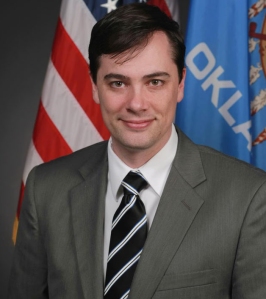![]()
I want to refer those in the Edmond and Guthrie areas to an article just released on Monday by Energy Wire reporter Mike Soraghan. Soraghan is the journalist at the forefront of reporting on the induced seismicity issue and his article speaks to the behind-the-scenes response to the Edmond/Guthrie quakes and is the best overview which I have seen to date and is a must read for local residents. I have taken the liberty of posting it on my blog at hd31.org/710.
This is one of the busiest weeks of the legislative year. Over the course of this week I expect to cast approximately 120 out of the 1,000 votes which take place each year.
Voting is the most important part of a state representative’s job and I endeavor to implement the the following voting strategies: I have never and will never intentionally walk or miss a vote; and, I will cast each vote in a consistent manner which is not capricious or arbitrary but is instead aligned with the principles which I talked about when a candidate for office.
As I have attempted to apply principle to policy, I have found that I have evolved into one of the House’s most prolific no voters. That said, it’s been my goal to never fall into the trap of voting no for the sake of voting no but to be able to explain and defend each no vote. I have found that if I have a sound and consistent basis for voting no that other House members are appreciative of the thought process behind the no vote even though it is a vote against their bill. While they may disagree with my reasoning they know that the vote is in no way personal.
To accomplish the goal of consistent, principle-based voting I have developed a checklist of factors: the violation of any single one will likely lead me to vote no on a proposal. It’s a simple six-part checklist, but I suspect it catches anywhere from 20 to 30 percent of the bills which we consider.
It is as follows.
Are new government bureaucracies, boards, or commissions created by the proposal? This is probably the area in which we have made the most progress in recent years. For several years I would find that lawmakers would attempt to create new government organisms about as fast as we could repeal old ones. Now, thanks largely to Oklahoma Governor Mary Fallin’s veto threat, these bills simply don’t appear as often.
Does the proposal increase fees or taxes? These types of proposals still appear and advance through the Legislature several times a year. At a time when one can reasonably state that federal, state and local government taxes, fees and pass-on costs to the taxpayer take over 50% of his income, there is a great calling for conscientious legislators to stand in defense of the taxpayer.
Are tax loopholes, pork earmarks, special interest benefits, payouts or programs created or expanded? These bills frequently create very niche government giveaways. You may read more about these in my article of last week at hd31.org/709.
Will new government regulations result if the bill is approved? We consider a significant number of bills which expand current law and while there are sometimes good reasons for these proposals more often than not the right vote is the no vote.
Does the bill exempt government agencies from transparency laws? Each year agencies sponsor bills to create new open records and open meetings exemptions.
Are systemic checks and balances upon corruption (such as purchasing laws) weakened? As an example, last year the Legislature took the unfortunate step of increasing the no-bid county government purchasing limit from 10,000 to 15,000 dollars.
If a lawmaker can consistently cast his votes according to this simple checklist, he will on balance support and defend the taxpayer from intrusive and overreaching government and the special interests which exert influence over the government.
Thank you for reading this article. Your interest and input are much appreciated. Please do not hesitate to email Jason.Murphey@hd31.org with your thoughts and suggestions.




Be the first to comment on "My checklist for voting no"